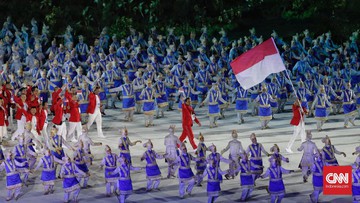
Indonesia won 31 gold at the 2018 Asian Games. The success was not just a false success of the host because there were several branches that showed stretching.
As the host, Indonesia has the privilege of including a flagship sport that is usually not competed in the Asian Games. At the 2018 Asian Games, Indonesia included pencak silat, jetski, bridge and paragliding.
Pencak silat is a 'gold mining' sport for Indonesia. Wewey Wita and his friends gave 14 gold medals, almost half of the gold medals won by Indonesia at the 2018 Asian Games.
Paragliding gives two gold, while jet ski donates one gold to Indonesia. While the bridge is unable to give a gold medal.
The choice of a flagship sport to boost the performance of the host is a natural thing. China as the most powerful country in Asia did it. They included dance when they swept 10 gold medals provided at the 2010 Guangzhou Asian Games.
It is strange if the host is not good at choosing a flagship sport that can boost their gold achievement on the standings.
The achievement of 31 gold will indeed be difficult for Indonesia to repeat in the upcoming Asian Games editions. But that does not mean that the success of Indonesia's achievements at the Asian Games will evaporate as the status of the host for the next four years disappears.
There are sports that can be expected to become a medal mine in the future. In addition to badminton and weightlifting that can compete at the level of Asia or even the world, there are other branches that can be expected in the future.
Archery proves they can look competitive. Diananda Choirunisa won a silver medal, while Riau Ega got a bronze medal. This achievement proves that Indonesian archery athletes can compete with South Korea which is often dominant in this branch.
With a well-organized training program and the many tournaments being followed, the Indonesian Archery Team has the potential to give medals at the 2020 Olympics.
Karate and taekwondo sports branches are also able to prove themselves able to win gold medals at the Asian Games. Defia Rosmaniar (taekwondo) and Rifki Ardiansyah (karate) who are still young also indicate that martial arts athletes can compete at the Asian level.
The Indonesian tennis team also provides evidence that Indonesia can also succeed in the 'Olympic branch'. The success of Christopher Rungkat and Aldila Sutjiadi winning the mixed doubles is proof that Indonesia can return to tennis in the Asian region like two decades ago and before.
The sepak takraw team was able to make history with the first gold record at the Asian Games since sepak takraw began competing in 1990.
The athletic sports branch also has a promising future for the Red and White Team. The reason is, the men's relay team won the silver medal in the men's 4x100 meter number with young runners. Then there was Muhammad Zohri who was 18 years old and Bayu Kertanegara 20 years old. The age of 23 years belonging to Eko Foresters is also a category that can develop even further.
In total there are 24 sports that have successfully awarded medals, which means that there are many potentials that can be developed for other multi-event preparations, ranging from the SEA Games, Asian Games and Olympics.
Although the SEA Games level is lower, Indonesia must improve the fifth place record with 38 gold, 63 silver and 90 bronze at the 2017 SEA Games next year. Therefore, the training camp of post-Asian Games athletes must be planned properly and correctly.
As for the 2022 Asian Games, it is clear that the 31 gold obtained at this time cannot be used as a benchmark for measuring success in the next four years.
There will be sports that can no longer fight for gold for Indonesia because it is not contested. Indonesia's success barometer can be measured by the golden comparison of the 2014 Asian Games.
With Indonesia being able to win more gold medals than 4 gold, plus getting more medals from 2014 [10 sports], it could be an indicator of the success of the Indonesian contingent.
To realize this ambition, Indonesia has succeeded in making a solid foundation with the achievements currently carved out. Obviously, the success of Indonesia this year is not just a false success of the host, but of course the conditions of coaching continue to be consistent in the coming years.
Comments